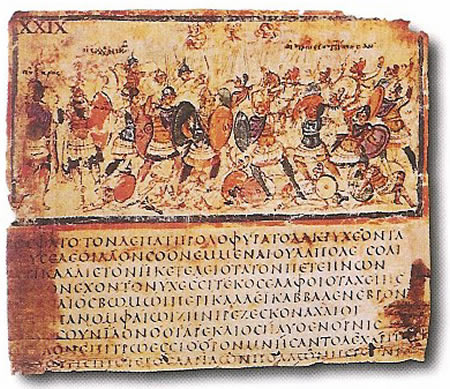Late 5th or early 6th century AD codex of Book VIII of the Iliad, l. 248-253.
The impetus behind this post began with reading a single word:
“cohorts.”
A small word, usually inconsequential, but all on its own on the pages of Robert Fagles’ translation of Homer’s Iliad, enough to launch a thousand thoughts.
The last couple months have seen me take a break from my usual historical fare to revisit some old friends. I recently realized that, while I graduated from Gettysburg with a minor in Classics, am a self-professed amateur historian of the ancient world (as many regular readers of Concerning History surely know), and took both Latin and Ancient (Attic) Greek in high school, I did not own a copy of any of the three foundational pieces of western literature: the Iliad and Odyssey of Homer and the Aeneid of Virgil. I soon corrected that Christmas 2019 with the boxed set of the peerless Robert Fagles’ translations, and began to dive into them just as COVID-19 lockdowns began to go into effect. As the world shuts down, then, I’ve been entering a heroic ancient world of gods and monsters.
All of this brings us back to “cohorts.” As the Achaeans and Trojans fight across the plains of Ilium, Fagles uses the word “cohorts” to describe the ranks of Greeks that Agamemnon rallies behind him. At first glance, this isn’t surprising. Translators must make use of all the possible meanings of the words of ancient languages to bring their audiences variety. It is still possible to pursue literal accuracy in one’s translation (as I did in high school with the Aeneid and Book 9 of the Odyssey), but the result is many times not the most eloquent. As an old English teacher of mine used to say, “Translations are like mistresses. The good ones are never faithful, and the faithful ones are never good.” This particular gloss, however, came with a specific historical cost. While “cohort” has evolved to mean any large group of organized people in the English language, it derives from Latin, being the specific organizational sub-unit of the Roman army’s century. Applying it to Bronze Age Greeks, therefore, seemed like blasphemy to me.
The more I reflected, however, the more I realized the lunacy of my position. Sure, “cohort” might have been a little anachronistic, but I was reading a translation of an ancient Greek epic in a language that wouldn’t exist for millennia after these poems were first written down. What is a literal translation of another language, anyway? Such an idea inherently cannot make sense. Like scales falling from my eyes, many of my other more particular reservations with Fagles’ translations and even other adaptations of historical material fell away, to be replaced with a more relaxed vigilance. While I still intend to keep an eye out for anachronism, I can only hope that my newfound translational relativism will free me from the pitfalls of adhering too strongly to such an approach, and, as I enter the third of what I’ve begun calling “the Ilium trilogy,” allow me to appreciate the timeless resonance of these poems all the more.
